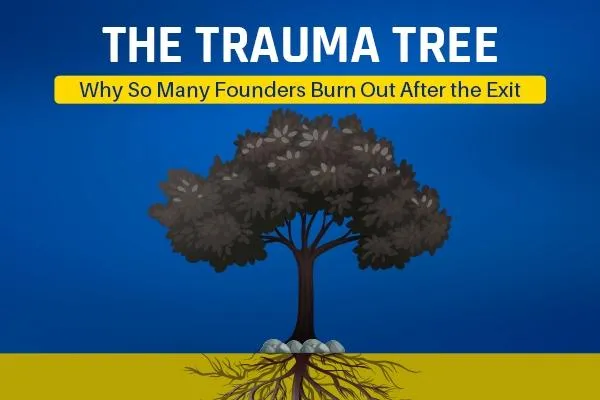
The Trauma Tree: Why So Many Founders Burn Out After the Exit
Introduction James thought selling his company would be the pinnacle of his career the long awaited moment of validation, freedom, and rest. Instead, it felt like hitting a wall at full speed. He had money, but no purpose. Time, but no peace. And though he wouldn't admit it to anyone, a quiet dread had begun to grow inside him. What was happening?
What James was experiencing wasn’t rare. In fact, it’s alarmingly common among founders. He was caught in the Founder’s Exit Paradox the confusing emotional aftermath of achieving what he thought he wanted, only to feel disoriented and empty. The exit itself, rather than bringing peace, was traumatic. And the Trauma Tree helps explain why so many apex performers unravel when the business is no longer there to prop up their identity.
THE ROOTS: Identity Entanglement James had always been the builder, the problem-solver, the one who made things happen. But underneath that drive was something deeper: a need to be seen, to prove his worth, to outrun the fear that he wasn't enough. These patterns didn't start with entrepreneurship—they were rooted in childhood expectations, quiet wounds, and stories he'd never questioned.
These unresolved core memories formed the roots of his Trauma Tree. His business became the structure he wrapped himself around. Once it was gone, so was the scaffolding of his identity. That’s when the urgency, self-doubt, and disorientation began to surface.
THE TRUNK: Emotional Turbulence Without the buffer of daily operations and urgent problems to solve, James was flooded with emotions he'd long ignored. Guilt over not feeling happy. Grief over what he gave up along the way. Fear that he was now irrelevant. A haunting sense that his best days were behind him.
But James didn't have the tools to deal with those emotions. Like many founders, he tried to intellectualize them, suppress them, or distract himself. This created emotional turbulence—an invisible but powerful instability that affected everything from his mood to his decision-making.
THE BRANCHES: Mental Health Struggles Out of that turbulence grew something more recognizable: anxiety, burnout, and a gnawing isolation he couldn’t shake. Even surrounded by people, James felt alone. He didn’t trust his instincts anymore. He couldn’t sleep. He didn’t want to talk about it because it all sounded ridiculous—even to him. After all, he had “won.”
These branches are where many founders seek help—but often only after the symptoms become unbearable. The mistake is focusing solely on the visible struggles while ignoring the root system driving them.
THE LEAVES: Coping by Control James tried to cope by staying busy. He began mentoring, started exploring a new venture, even tried filling his calendar with travel and events. But none of it filled the void. He was using productivity as a numbing agent—controlling his environment to avoid feeling the internal chaos.
Over time, those coping strategies began to fray. His relationships strained. His health took a hit. His sense of purpose dimmed. These behaviors weren’t irrational—they were attempts to survive a nervous system still wired for urgency and unresolved fear.

If James’s story feels uncomfortably familiar, you’re not alone. The Trauma Tree isn’t just a metaphor—it’s a mirror. And while it may reveal uncomfortable truths, it also points to a way forward.
Healing doesn’t start with more success. It starts with reexamining the stories at your roots. With integrating the emotions you’ve been taught to suppress. With shifting from survival patterns to grounded leadership.
This is the work we do through the NEO Assessment and our transition frameworks. You don’t have to stay stuck in the loop of burnout and over functioning.
James’s healing began when he stopped trying to fix the symptoms—and started tending to the roots. Yours can too.
Your dreams should be real.
